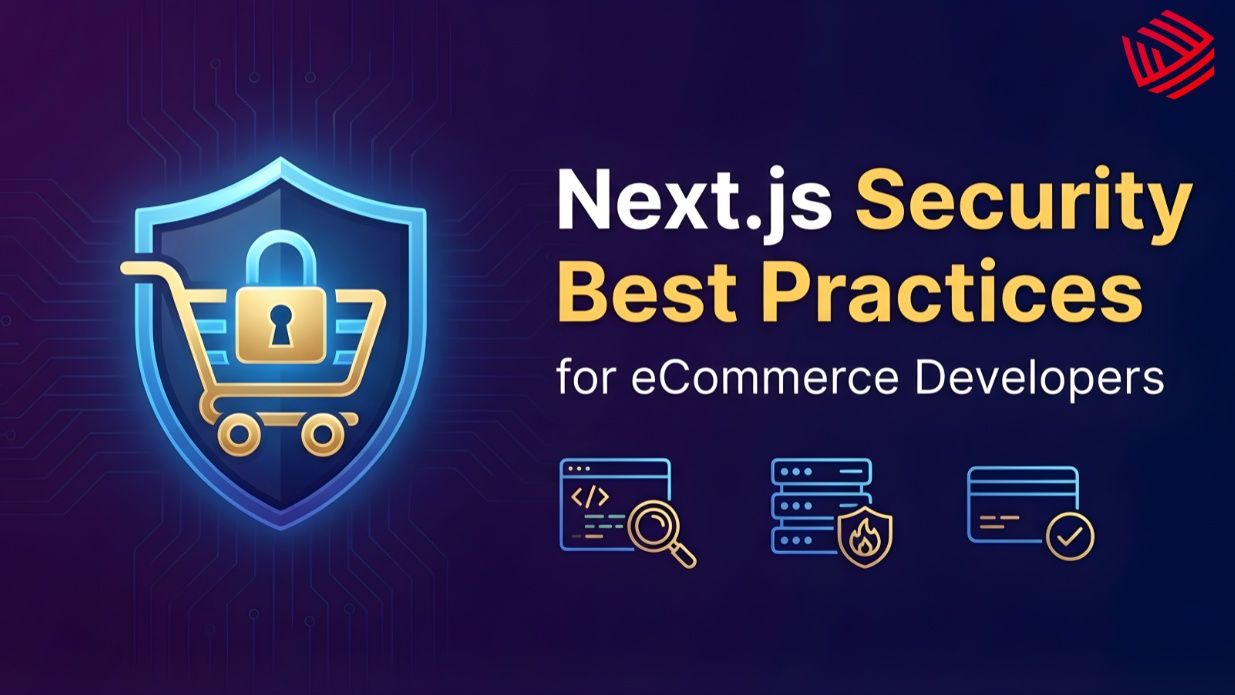
Next.js Security Best Practices for eCommerce Developers
Security is critical for modern eCommerce platforms. This guide explains practical Next.js security best practices to help developers protect data, payments, users, and business operations.
Skilled Node.js Developers
Transparent Work Reports
Full IP & NDA Protection
Quick Onboarding
15-Day Replacement
Remote or Onsite

Our NodeJS developers create high performance backends, utilizing NodeJS asynchronous nature to manage concurrent connections efficiently.
We build robust and maintainable systems that seamlessly integrate with various technologies, empowering dynamic user experiences.
We specialize in developing server-side applications that leverage NodeJS speed and efficiency, delivering exceptional performance and responsiveness.
Our expertise in optimizing server side logic and API integrations provides a seamless, high quality user experience.
Build scalable, high-performance enterprise web apps with NodeJS, achieving agility and cost efficiency.
Frontend & Backend Expertise in NodeJS
Affordable NodeJS Solutions
Fast NodeJS Project Delivery
Efficient NodeJS Troubleshooting
Scalable & Adaptable NodeJS
Clear Communication

Our NodeJS developers are proficient in modern backend technologies and tools, ensuring your application runs efficiently, securely, and at scale.
The team delivered high-quality work that met our expectations in terms of design and functionality.
Join Dappinity to work at the forefront of digital innovation, collaborating with top-tier tech talent on meaningful projects for global clients. We offer a flexible, remote-friendly work environment, competitive compensation, and clear career growth opportunities. At Dappinity, you’ll enjoy continuous learning, mentorship, and recognition in a collaborative, inclusive culture that values creativity, impact, and professional development. Elevate your career while shaping future-ready solutions with us.
Dappinity provides expert NodeJS Developers offering scalable, innovative, and client-focused solutions while ensuring high quality and timely project delivery.
The dedicated NodeJS Developers team at Dappinity delivers innovative, scalable, and secure solutions, ensuring seamless collaboration and future ready applications.

Tell us what you need - tech stack, experience, timelines.

We send you pre-screened developers matched to your needs.

You interview. You decide. Start in as little as 72 hours.

Easily scale up or down. We stay flexible as you grow.
When hiring NodeJS developers, it’s important to align the right engagement model with the scope and budget of your project:
Ideal for long-term, ongoing projects that require continuous development, such as building large-scale web applications, real-time platforms (chat apps, live dashboards), or backend systems that rely on NodeJS and Express.
Great for maintaining an existing NodeJS application, adding small features, bug fixes, or enhancing specific areas of the project without the need for a full-time developer.
Perfect for one-off tasks or short-term objectives, like optimizing NodeJS APIs, refactoring code, or implementing specific features such as authentication systems or third-party integrations.
Best for projects with clear deliverables and deadlines, like building a REST API, creating microservices, or developing a real-time web application using NodeJS with WebSockets.
Selecting the right development methodology ensures that your NodeJS project stays on track and meets the required deadlines:
Perfect for NodeJS projects that require flexibility and rapid iteration, such as developing real-time apps, SaaS products, or APIs. Agile allows for continuous feedback and adjustment during the development process.
Ideal for large teams working on NodeJS applications with various components like microservices, APIs, and databases. Scrum’s sprint-based approach allows focused work on specific features and modules.
Best for simpler, well-defined projects like building a simple NodeJS app, a REST API for a single service, or an application where requirements are set and won’t change.
NodeJS is known for its speed and scalability. Here’s how NodeJS fits into modern tech stacks:
JavaScript (ES6+), NodeJS, npm, Yarn, ExpressJS
For Web Development, popular frameworks include ExpressJS, KoaJS, and HapiJS. Real-time applications often leverage Socket.IO and WebSockets. API Development commonly involves building RESTful APIs or using GraphQL with Apollo Server. For building Microservices, frameworks like NestJS and Seneca are frequently used.
NodeJS is commonly used to build APIs that serve frontend frameworks such as React, Angular, or Vue. It can also be used in full-stack JavaScript development for seamless integration.
NodeJS offers a rich set of tools and libraries that enable it to handle everything from microservices to real-time data processing.
For any NodeJS project, maintaining high code quality ensures scalability, performance, and maintainability:
Automate the build, testing, and deployment pipelines to ensure consistent quality, reduce human errors, and speed up time-to-market.
When working with NodeJS developers, security and intellectual property protection are crucial:
Maintaining a focus on security and IP protection ensures your NodeJS project remains safe from threats and that you retain control over your valuable code.
Engage Dappinity for your NodeJS development to leverage our expert team, building scalable and high-performance backend solutions customized to your business needs. We deliver robust applications, utilizing the latest technologies and best practices ensuring every requirements fulfillment.
 Transparency
Transparency Strict Privacy Assurance with NDA
Strict Privacy Assurance with NDA Talented Team of Developers
Talented Team of Developers 12 Months Free Support
12 Months Free Support Smooth Collaboration & Reporting
Smooth Collaboration & Reporting On time Delivery, No Surprises
On time Delivery, No Surprises Efficient & Adaptive Workflow
Efficient & Adaptive WorkflowNodeJS is an open-source, JavaScript runtime built on Chrome’s V8 engine. It allows developers to run JavaScript on the server side, enabling full-stack JavaScript development. NodeJS is highly popular for building fast, scalable network applications, real-time applications, and APIs due to its non-blocking, event-driven architecture.
NodeJS is ideal for:
1. Real-time applications (chat apps, live updates)
2. RESTful APIs and microservices
3. Streaming applications
4. Single-page applications (SPAs)
5. Server-side applications
6. Internet of Things (IoT) applications
NodeJS uses a non-blocking, event-driven architecture with a single-threaded event loop to handle concurrent operations. Instead of waiting for tasks to complete, NodeJS delegates them to the background and continues processing other requests, making it highly efficient for handling large numbers of I/O operations concurrently.
NodeJS is fast because it uses the V8 JavaScript engine, which compiles JavaScript directly to machine code for execution. Its asynchronous, non-blocking nature allows it to handle many requests simultaneously without waiting for each to finish, resulting in faster response times and better scalability.
Popular NodeJS frameworks include:
1. ExpressJS: A minimal and flexible framework for building web applications and APIs.
2. KoaJS: A lightweight, modern framework created by the same team behind Express.
3. NestJS: A framework for building scalable, maintainable, and efficient server-side applications using TypeScript.
4. HapiJS: A rich framework for building powerful applications with a focus on flexibility and extensibility.
NodeJS works well with various databases, including:
1. MongoDB (NoSQL, document-based)
2. MySQL and PostgreSQL (SQL-based relational databases)
3. Redis (In-memory key-value store)
4. Cassandra (NoSQL, distributed database)
NodeJS can interact with these databases using libraries like Mongoose for MongoDB or Sequelize for SQL databases.
NodeJS is highly scalable due to its non-blocking, event-driven architecture. It can handle a large number of simultaneous connections with minimal overhead. For scaling applications, developers can use techniques like load balancing, clustering, and leveraging microservices to spread the load across multiple servers.
NodeJS uses the npm (Node Package Manager) to manage dependencies. With npm, you can easily install, update, and manage libraries and packages for your project. You can also define your project's dependencies in a packageJSon file.
NodeJS itself is secure, but like any platform, developers need to follow security best practices. This includes using security headers, validating and sanitizing user inputs, preventing SQL injection, and encrypting sensitive data. Additionally, there are several libraries available, like helmet for securing HTTP headers, and jsonwebtoken (JWT) for managing authentication securely.
To hire a NodeJS developer from Dappinity:
1. Share your project requirements with us.
2. Receive a curated list of skilled NodeJS developers.
3. Interview the candidates to assess their expertise.
4. Select the best developer and begin development with support and collaboration.







